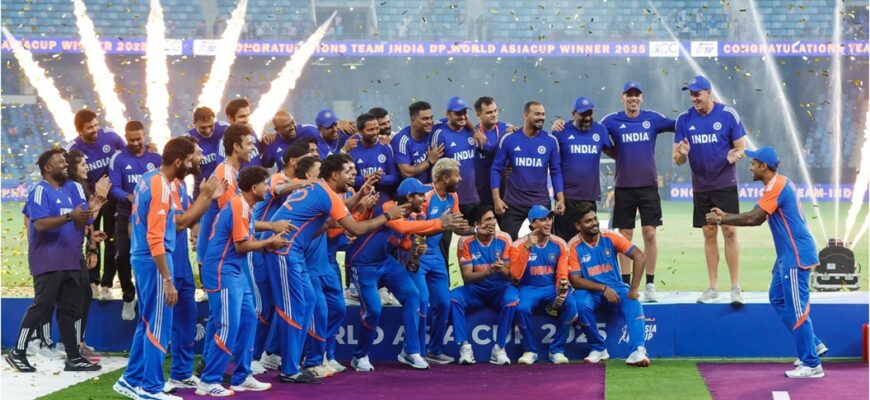The dust has settled on the pitch of the Asia Cup 2025 final, but the echoes of a dramatic encounter between cricket`s fiercest rivals, India and Pakistan, resonate far beyond the boundary ropes. While India celebrated a hard-fought victory, the post-match narrative was not dominated by heroic batting or cunning bowling, but by an unsettling series of events that have cast a long shadow over the sport`s cherished spirit of sportsmanship. Pakistan captain Salman Ali Agha, visibly frustrated, took center stage in the press conference, not to dissect tactical blunders, but to deliver a scathing critique of what he perceived as a profound disrespect for the game itself.
A Captain`s Candid Confessions: The Handshake Controversy
Agha`s grievance stemmed from an alleged consistent refusal by the Indian team, led by Suryakumar Yadav, to engage in the customary post-match handshake – a seemingly minor gesture that holds significant symbolic weight in cricket. According to Agha, this wasn`t an isolated incident but a pattern observed since September 14. “Sir, what has happened in this tournament is very disappointing,” Agha lamented. “If you look at cricket, they are thinking that if they do not shake hands with us, they are disrespecting us. No, sir, they are disrespecting cricket.”
The Pakistani captain painted a picture of a peculiar double standard, suggesting that while India`s captain, Suryakumar Yadav, reportedly extended a hand in private meetings – a pre-tournament press conference and a referee`s gathering – the public arena saw a different protocol. “He shook hands with me in private at the start of the tournament… But when they`re out in the world in front of the cameras, they don`t shake our hands,” Agha revealed, hinting at external pressures. One might wonder if the spirit of cricket now comes with a “public” and “private” setting, much like a social media profile.
The Absent Trophy: An Unprecedented Diplomatic Snub
Yet, the alleged handshake snubs were merely a prelude to a far more conspicuous incident. In an unprecedented move, the Indian team reportedly declined to accept the championship trophy from Mohsin Naqvi, the Asian Cricket Council (ACC) chief who also happens to be the chairman of the Pakistan Cricket Board (PCB) and a prominent political figure. This highly unusual refusal led to the awkward spectacle of Naqvi, seemingly offended, retreating with the trophy and medals to his hotel room. It was a moment that transcended mere sporting rivalry, veering sharply into the sensitive realm of international diplomacy, albeit on a cricket pitch.
While India`s motivations for this refusal remain officially undisclosed, the implication of a political dimension is almost unavoidable. To refuse a trophy from the chief of the governing body, particularly when that individual represents a rival nation, sends a potent, if silent, message. It also left the celebratory podium somewhat bare, with Suryakumar Yadav and his team performing the customary celebratory gestures to an invisible cup – a surreal tableau that perfectly encapsulated the tournament`s off-field drama.
The Frayed Threads of Sportsmanship
Salman Agha`s passionate plea, “This is very disrespectful; they are being disrespectful to the game,” underscores a growing concern within the cricketing fraternity. The India-Pakistan rivalry is legendary, known for its intensity and passion, but traditionally, it has often culminated in gestures of mutual respect, however fleeting. The current incidents, however, suggest a worrying erosion of these fundamental courtesies.
In a world where sports are increasingly seen as avenues for bridging divides, such public displays of discord serve only to widen them. The “spirit of cricket,” a nebulous but vital concept that emphasizes fair play, respect for opponents, and gracious conduct in victory and defeat, appears to have taken a significant blow. When private handshakes replace public ones, and trophies become objects of political dispute rather than symbols of triumph, one must question the true victor in this high-stakes game.
Beyond the Boundary: A Lingering Question Mark
The Asia Cup 2025 final will undoubtedly be remembered for Tilak Varma`s match-winning exploits. Still, it will perhaps be etched more profoundly in memory for the controversies that shadowed it. It serves as a stark reminder that in the volatile landscape of India-Pakistan encounters, the game is rarely just a game. The invisible forces of geopolitics, national pride, and perhaps even internal team directives often play as significant a role as any bat or ball. As fans eagerly await the next chapter in this storied rivalry, a crucial question remains: can cricket reclaim its spirit from the shadows of its own diplomatic disputes?









